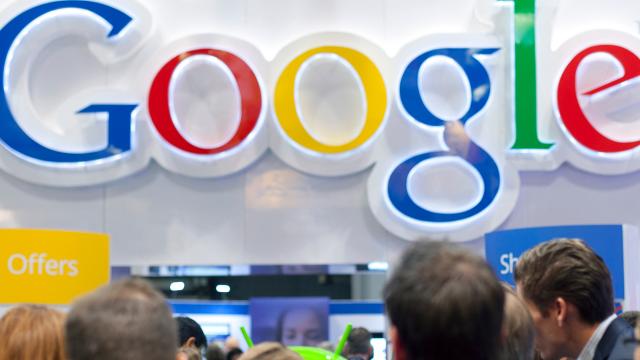Internal Google documents obtained by the Guardian warn full-time Google staff to treat temps, vendors, and contractors (TVCs)—which comprise just short of half of the company’s 170,000 workers around the globe—much differently than they treat fellow full-timers.
According to the Guardian, an internal training document titled “The ABCs of TVCs” (seemingly written by parent company Alphabet) instructs staff that “Working with TVCs and Googlers is different. Our policies exist because TVC working arrangements can carry significant risks.”
The document warns Google staff to leave TVCs out of team meetings where “strategic or proprietary information” may be shared, as well as cautions against rewarding productive TVCs with gifts like shirts from the Google store. The Guardian wrote that two employees said security guards (who are also TVCs) are sometimes used to keep the non-employees out of events like weekly all-hands meetings:
The training instructs Google employees not to invite TVCs to all-hands meetings, team offsites, or the company’s weekly “TGIF” meeting, where employees vote on questions to post to top executives. Indeed, according to two current employees, the company often employs security guards to stand outside all-hands meetings, admitting those whose employee badges are white (FTEs) and keeping TVCs, whose badges are red, outside. The security guards themselves are subcontracted and wear red badges.
Another part of the document warns that a theoretical Google employee named “Gary,” who wants to give thanks to TVCs who contributed to a “big milestone… should not reward them with shirts”:
Swag, bonuses, and other gifts are considered taxable income to the individual (which Alphabet cannot report since we are not the TVC employer). It can also raise ethics and compliance concerns. Finally, we need to respect and adhere to local laws and regulations, and TVC employers may have strict policies about receiving gifts.
Instead, the document recommends Gary send a thank you note to them and their employer or via Google+ (the company’s soon-to-be-defunct social platform).
TVCs are also restricted from attending training programs beyond job-related tasks, paying for travel expenses with a “Gcard,” or listing themselves as working for Google on any social platforms like LinkedIn or on resumes without mentioning their contractor status, the Guardian wrote.
The documents say Google has implemented these rules regarding TVCs for three reasons: potential “code of conduct” violations, the possibility of security risks or unauthorised leaks, and “co-employment” concerns. That last one is reportedly the paramount concern, and it’s all about money, with Google wishing to avoid liability for “employer obligations.”
“Co-employment is a relationship between two or more employers in which each has actual or potential legal rights and duties with respect to the same employee,” the documents read. “If found to be a joint employer of a TVC by an agency or court, then Alphabet could be liable for employer obligations, as well as acts and omissions leading to employment related legal claims.”
A Google software engineer characterised the rules to the Guardian as an attempt to justify classifying so much of the company’s workforce as non-employees: “If someone sues them, they want to point at all this fake shit and say, ‘Hey look, there’s such a big difference, see?’… We are legally in the clear to treat people like garbage.”
As Bloomberg previously reported, TVCs “write code, handle sales calls, recruit staff, screen YouTube videos, test self-driving cars and even manage entire teams,” yet are excluded from the benefits full-time Google staff get. The news agency wrote the situation is akin to a “permanent underclass” among Google workers, with TVCs retaining some benefits like free cafeteria food and facilities access but often working for contract agencies which skimp on benefits like health care. (One contractor told Slate it was a “caste system.”) While sources said some talented specialists can be offered as much as $US150 ($207) an hour before taxes, Bloomberg reported, others like sub-contracted janitors may make short of $US33,000 ($45,646) a year before benefits.
One contract worker told Bloomberg TVCs spend much of their day “tagging” their tasks in systems designed to minimise transition costs if their role is terminated or automated, while another said TVCs can be subject to abrupt firing at any time.
After Google staff staged a walkout over reports the company’s management had offered lucrative exit packages to executives accused of sexual misconduct, sources told Gizmodo promised reforms to its convoluted sexual harassment-reporting system did not include contractors.
Google is under pressure to keep official headcount low in order to please investors, Bloomberg noted, and its heavy reliance on non-employee workers mimics patterns at other Silicon Valley titans like Facebook and Apple, which use TVCs as a disposable workforce to achieve business goals. The Guardian pointed to a $US97 ($134) million settlement in 2000 between Microsoft and “permatemps” as one of the potential hazards of that approach, though the 8,000-12,000 workers estimated to have received payouts in that suit pale in comparison to the number of TVCs hired by Google.
In an open letter to CEO Sundar Pichai this month, TVCs alleged that unequal treatment had included not receiving the real-time security updates employees received during a shooting at YouTube in April 2018. The TVCs also wrote that in an age of record Google profits, they deserved “better pay and access to benefits that meet the full-time employee standard, including high-quality healthcare, paid vacations, paid sick days, holiday pay, family leave, and bonuses.”
In a statement to the Guardian, Google spokesperson Jenn Kaiser said, “We hire Google employees to work on jobs that are core to our business, and look to temps, vendors and contractors when we either don’t have the expertise or infrastructure ourselves, or when we need temporary help due to employee leaves or short-term projects. Temps, vendors and contractors are an important part of our extended workforce, but they are employed by other companies, not Google.”
